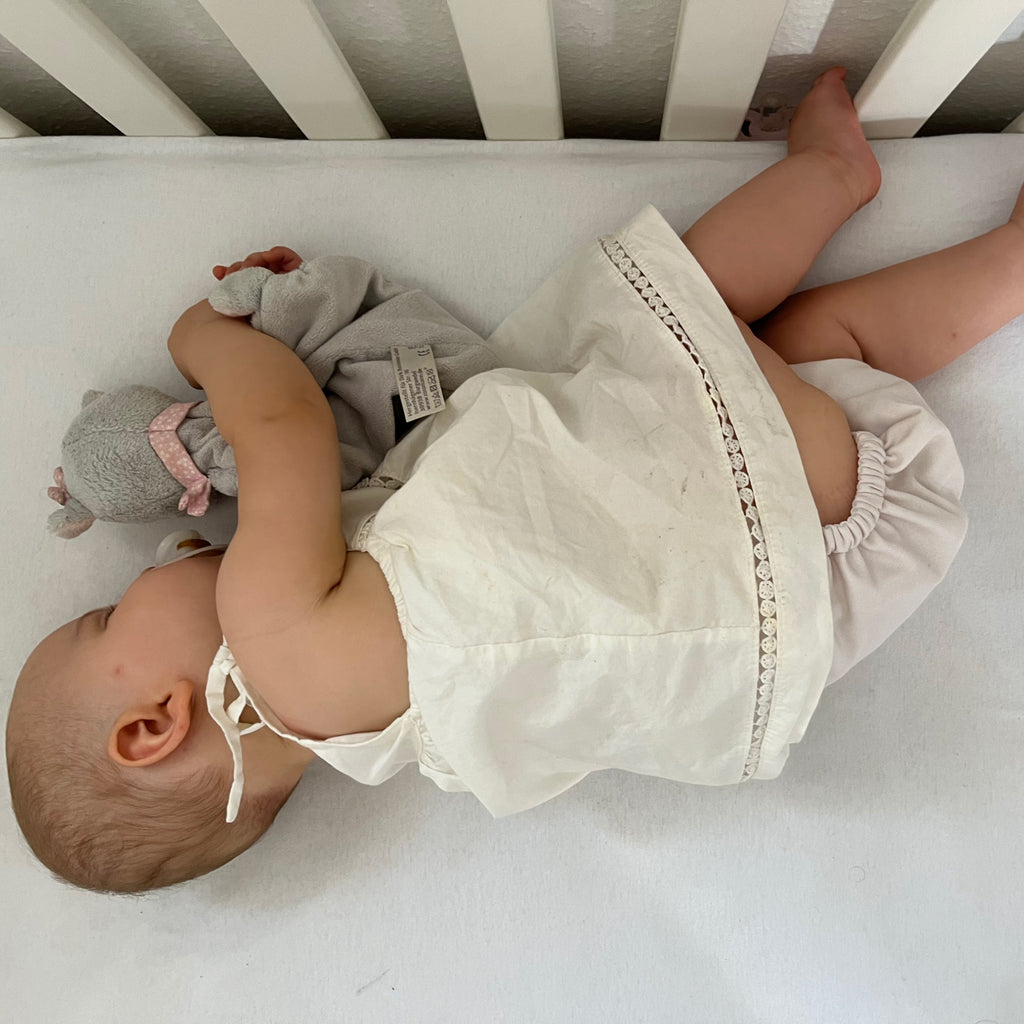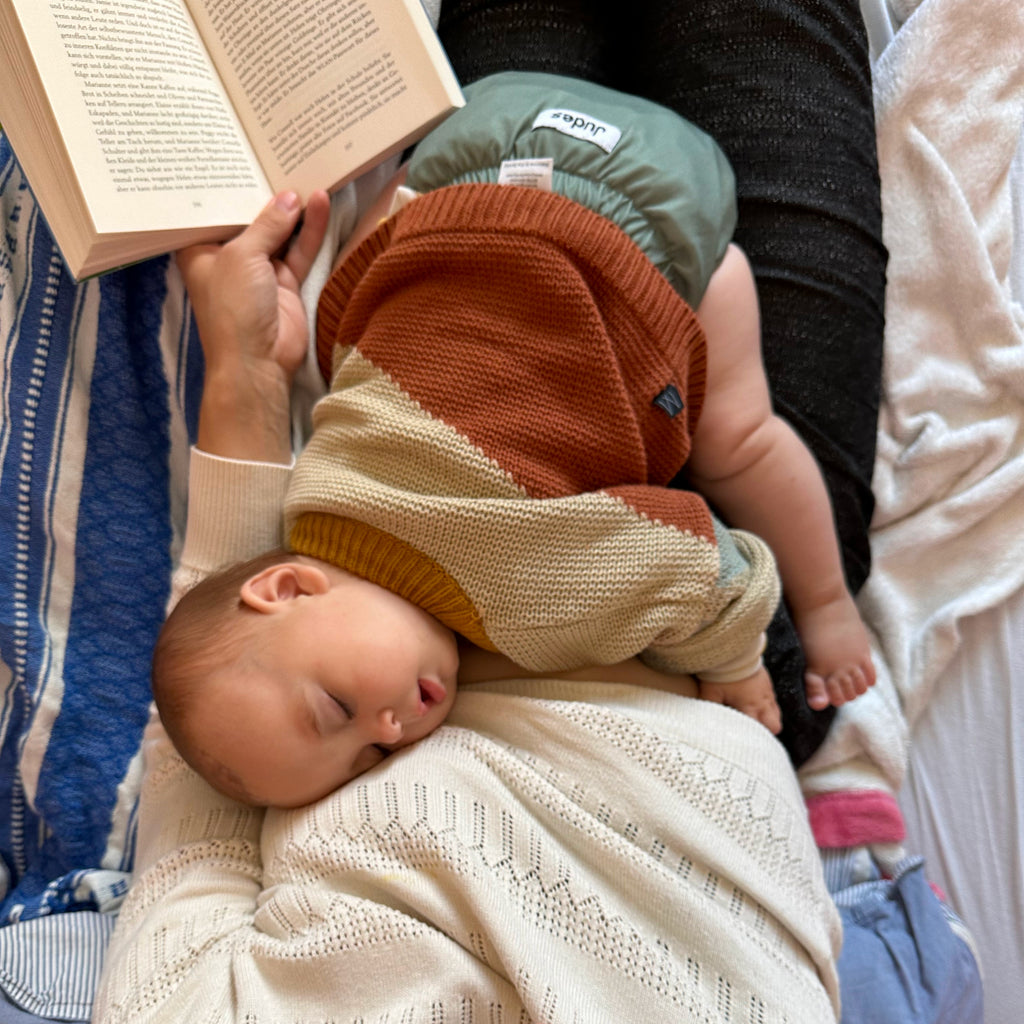What to do when the baby doesn't sleep at night?
Updated on:
Photo by @lea.annah
If your newborn won't sleep at night, you're not alone. We know that the first time with a baby can be both wonderful and challenging. It's as if your child is throwing a secret party – and just the two of you are invited. But don't worry, this party won't last forever.
How many hours of sleep does a baby need? Babies generally need more sleep than adults. Newborns can sleep 14 to 17 hours per day, spread out over the day and night. As they get older, the amount of sleep needed decreases; six-month-old babies sleep about 12 to 15 hours per day.
We understand that you only want the best for your baby. That's why in this article we'll give you practical tips to gently manage sleep times and understand your child's sleeping behavior.
Baby and Toddler Sleep Behavior
Your baby's sleep behavior is a fascinating journey that begins in the womb. In the first few weeks of life, newborns seem to have no distinction between day and night. This is perfectly normal, as their bodies must first adjust to life outside the womb. Over time, a more regular sleep-wake rhythm develops, which continues to solidify over the course of the first years of life.
Baby Sleep Cycles: Why Are They Different?
Babies go through shorter sleep cycles than adults and, therefore, wake up more frequently. While adults have 90-minute cycles, babies only have about 50 minutes. These shorter cycles are important for the rapid development of their brains. So, each awakening is essentially a check-in, a little safety check: Is everything okay? Am I safe? Am I hungry? All these questions race through the little one's head in seconds before heading back to the land of dreams – or not.
Here's a table showing how much sleep a baby or toddler typically needs:
|
Age |
Total Daily Sleep Requirement |
Notes |
|
0-3 Months |
14-17 Hours |
Sleep is often in short intervals across the day and night. |
|
4-11 Months |
12-15 Hours |
Most babies start to sleep through the night, nocturnal feedings can interrupt sleep. |
|
1-2 Years |
11-14 Hours |
Children at this age typically take one or two naps during the day. |
|
3-5 Years |
10-13 Hours |
Napping decreases, while the night accounts for most of the sleep. |
These figures are guidelines and can vary from child to child!

Photo by @madame.vio
Why Do Babies Wake Up So Often at Night?
The world is a place full of wonders for your baby, and the night is no exception. Every sound, every sensation is new and exciting – or sometimes unsettling. These nocturnal wakeful periods, as tiring as they may be for you, are a normal and healthy part of your baby's development. Their nature is to explore the world and ensure you are always close by – as a source of comfort and nourishment.
From Hunger to Teething: Various Reasons Why Your Baby Isn't Sleeping
- Hunger: Hunger is one of the most obvious reasons for waking up at night. Your newborn has a tiny stomach and therefore needs to feed more frequently – unfortunately, that includes nighttime as well.
- Physical Discomfort: Other physical discomforts like colic, gas, or the pressure from a full diaper can also disrupt your baby's sleep. Not to forget the teething pains that often begin just when you think you have finally established a bedtime routine.
- Safety: Sometimes, less tangible reasons play a role. A lack of routine or an environment that is not quite conducive to sleep can also be factors. Maybe your baby just needs your closeness, some gentle rocking, or a soothing song to find its way back to sleep.
- Inappropriate Sleep Environment: In some cases, your baby's restlessness may also be a sign that it is reacting to something in its sleeping environment. Is it perhaps too bright or too loud? Or does your baby feel overheated or too cold? All these factors can affect your little one's sleep.
How Can My Baby Sleep Better? Tips for a Peaceful Night
One of the most effective methods to help your baby fall asleep is establishing a consistent bedtime routine. This routine could include a warm bath, a gentle massage, or reading a bedtime story. The goal is to signal to your baby that it's time to calm down and get ready for sleep. Consistency and repetition are key here – babies love predictability.
Optimizing the Sleep Environment: Peace and Comfort for Your Baby
Your baby's sleep environment plays a crucial role in promoting healthy sleep. A cool, dark, and quiet room is ideal. Check if your baby's diaper is comfortable and leak-proof so that dampness doesn't disturb them. A cloth diaper can work wonders here. Not only does it feel exceptionally soft, but it also holds up longer than typical disposable diapers.
A comfortable diaper is often a prerequisite for uninterrupted sleep. Cloth diapers from Judes are designed to keep your baby dry while preventing skin irritations. They're breathable and ensure an optimal temperature at your baby's bottom, which is especially important as overheating can be one of the reasons for poor sleep. Moreover, cloth diapers are a sustainable choice that benefits not only your baby but also the environment.
Better Sleep Thanks to Judes Cloth Diapers
Choosing the right diaper can make a big difference when it comes to helping your baby enjoy uninterrupted sleep. Judes cloth diapers are designed with love for delicate baby skin, offering the softness and absorbency your baby needs for a peaceful night.
Cloth diapers are a healthy alternative to disposable diapers, which often contain chemicals that can irritate your baby's sensitive skin. Our cloth diapers are free from these substances and reduce the risk of diaper rash. They also conform better to your baby's movements, meaning fewer restrictions and more comfort – two essential factors for good sleep.
Diapering Made Easy with Judes
Our cloth diapers are designed to provide maximum protection with minimal effort. The inner diaper is made of 100% organic cotton and is extremely absorbent. It stays dry for up to 12 hours, making Judes ideal for overnight wear. The cover acts as a moisture barrier. Most babies fit our cloth diapers right away, thanks to the flexible cuffs and infinitely adjustable closure that perfectly adapt to the body.
It was particularly important to us that changing diapers with Judes is simple. Just like with a disposable diaper, you first put on the inner diaper and then the cover – that's it. No preparation and no annoying folding required. Used diapers are placed in the diaper bag, where you can store them until laundry day.
Nighttime Diapering – How to Change Judes Without Disturbing Baby’s Sleep
Nighttime diaper changes don’t have to be a disturbing experience. With these tips, you can gently diaper your baby so they quickly return to the land of dreams:
-
Preparation is everything: Keep diapers, wet wipes, and a waterproof mat ready so you don’t have to search for them in the middle of the night.
-
Dim the lights: Use a small nightlight or your phone's light to create a calm atmosphere.
-
Use warm cloths: Use pre-warmed wet wipes to give your baby the most comfortable experience. Sustainable washcloths soaked in warm water are best.
-
Quiet and gentle: Move calmly and gently to avoid startling your baby.
-
Soothing sounds: A gentle hum or whisper can help your baby feel secure and comforted.
-
Efficient and quick: Be swift and efficient in changing to minimize awake time. The easy handling of Judes provides the perfect basis for a quick and uncomplicated diaper change.
-
Choose comfortable cloth diapers: Judes cloth diapers offer simple closures that are quiet and quick to handle.
-
Cuddle immediately after changing: Give your baby affection after changing to soothe them and ease the transition back to sleep.
By integrating these steps into your nighttime routine, you can help your baby feel clean and dry at night without significantly disrupting sleep.

Photo by @cafema.illustration
Conclusion: Your Companion for Quiet and Restful Nights
You now understand why your newborn isn't sleeping at night and how you can help them gently fall asleep. You can draw on your knowledge and our tips to establish a calming routine and create an ideal sleep environment. This will make nights more pleasant for you and your baby.
Remember, every baby is unique and what works for one may not work for another. It's a process of trial and adjustment, just like life with a little person who is developing and changing every day. And if you ever need support, remember the gentle, sustainable cloth diapers from Judes, designed to provide your baby with comfort and dryness, so both of you can find the well-deserved rest.
At Judes, we are proud to accompany you on this journey, with products that are good not only for your baby but also for our planet. Sleepless nights will come and go, but the love and care you put into each goodnight hug will always remain.

